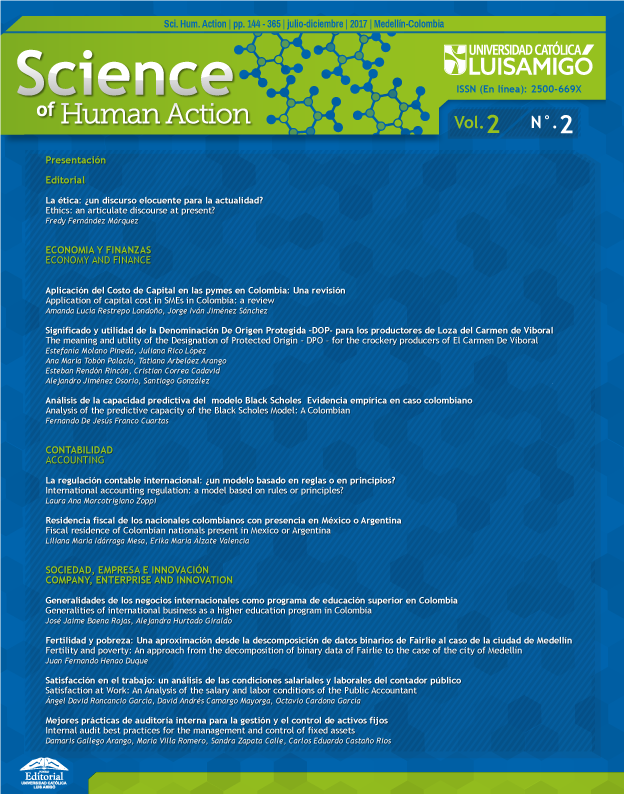Fiscal residence of Colombian nationals present in Mexico or Argentina
DOI:
https://doi.org/10.21501/2500-669X.2474Keywords:
Tax residence, double taxation, world income, income taxAbstract
The article presents the tax impact of Colombians with presence in Mexico or Argentina, identifies the effects of world income for tax residents in Colombia, both national and foreign who are inside and outside the country doing economic activities. This is the case of the agreement to avoid double taxation signed with Mexico, whose purpose is to deduct the income received in this country and on which it will not pay taxes in Colombia. In contrast, we find the Colombian with a presence in Argentina at a disadvantage, since there is no agreement to avoid double taxation, he must cancel the differential of the tax rate in Colombia, if the result generates that the Argentine tax rate is less than the one determined after debugging the world income.Downloads
References
Argentina. Poder Ejecutivo Nacional. (1997). Decreto 649.
Argentina. Poder Ejecutivo Nacional. (2016) Decreto 394.
Bravo Arteaga, Juan Rafael (2008) Editorial Universidad del Rosario. Derecho Tributario Escritos y Reflexiones - Edición Bogotá D.C.
Colombia. Congreso de la República. (2012). Ley 1607.
Colombia. Congreso de la República. (1971). Ley 17.
Colombia. Congreso de la República. (1944, 30 de noviembre). Ley 7.
Colombia. Congreso de la República. (2012). Ley 1568.
Colombia. Corte Constitucional. (2013). Sentencia C-221. Magistrado Ponente: Jorge Iván Palacio Palacio.
Colombia. Ministerio de Hacienda y Crédito Público (1989, 30 de marzo). Decreto 624, Estatuto Tributario Colombiano.
Colombia. Ministerio de Hacienda y Crédito Público. (2013, 27 de diciembre). Decreto 3028.
Colombia. Presidencia de la República. (1974). Decreto Ley 2053.
Congreso General de los Estados Unidos Mexicanos. (2015). Ley Impuesto Sobre la Renta 181115. Cámara De Diputados Del Honorable Congreso De La Unión. Secretaría General Secretaría de Servicios Parlamentarios.
Dirección de Impuestos y Aduanas Nacionales, DIAN. (2009). Concepto DIAN 065231.
Dirección de Impuestos y Aduanas Nacionales, DIAN. (2013). Oficio No.060192.
Dirección de Impuestos y Aduanas Nacionales, DIAN. (2014). Oficio No.062535.
Dirección de Impuestos y Aduanas Nacionales, DIAN. (2014). Oficio No.000790. (CDI México).
Dirección de Impuestos y Aduanas Nacionales, DIAN. (2015) Oficio No.001792. (CDI México).
Dirección de Impuestos y Aduanas Nacionales, DIAN. (2015). Oficio No.007234. Residencia para efectos fiscales en Colombia.
La ONU. (1951). Organización de las Naciones Unidas. Resolución 378.
Organización para la Cooperación y el Desarrollo Económico OCDE. (2010). Modelo de Convenio Tributario sobre la Renta y sobre el Patrimonio. http://www.oecd.org/centrodemexico/laocde/
Valencia, Alexis y Barreix, Alberto (2003). Impacto Fiscal en la Integración Económica - Secretaria General de la Comunidad Andina-Banco Interamericano de Desarrollo, página 119.
Downloads
Published
How to Cite
Issue
Section
License
PUBLICATIONS POLICY
• The author must send completed the declaration of transfer of economic rights and declaration of conflicts of interest, which will be provided by the management of the magazine. This document indicates the originality of the article, which is not published in another medium and that is not simultaneously postulated in another journal.
• The author will transfer all rights to the article to the journal Science Of Human Action.
• Once the evaluation of the article has begun, the authors agree not to withdraw it until the end of the process.
• The Science Of Human Action journal will submit the articles received for initial evaluation by the Editorial Committee, in case the Committee finds the material pertinent, it will be evaluated by two anonymous referees who will determine if it is publishable. If one referee approves and the other rejects it, a third party will be appointed.
• The address of Science Of Human Action will answer within a maximum of three (3) days about the receipt of the contribution received from the author.
• Printed items will not be received. All the proponents will have to send their writings through the e-mail of the magazine.
• Partial versions of the text will not be received, that is, those that are not structurally adjusted to the type of article.
• Once the article is sent, it is understood that the author authorizes the publication of these data.
• The reception of articles does not imply an obligation to publish them. The authors are directly responsible for the ideas, judgments and opinions expressed in the articles; in such a way that the content does not compromise the thinking of the Editorial Committee or the Institution.
• Once the article is submitted, it is understood that the author authorizes the publication of the data corresponding to the author's note.
• This is an open access journal that does not charge authors for either the editorial process or the publication. All costs of editorial production are assumed by the Luis Amigó Catholic University.
ETHICS OF PUBLICATION
• The Editorial Committee, by virtue of transparency in the processes, will ensure the academic quality of the journal.
• Causes of rejection are considered: plagiarism, adulteration, invention or falsification of content and author data, which are not original and unpublished.
• In no case, the journal's management will require the author to cite it or publish articles with conflicts of interest.
• If once the article is published: 1) the author discovers substantive errors that threaten the quality or scientificity, may request its removal or correction. 2) If a third party detects the error, it is the obligation of the author to retract immediately and proceed to the public removal or correction.


